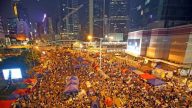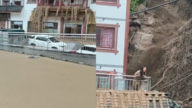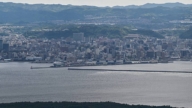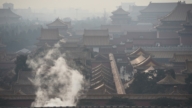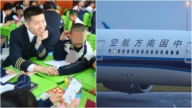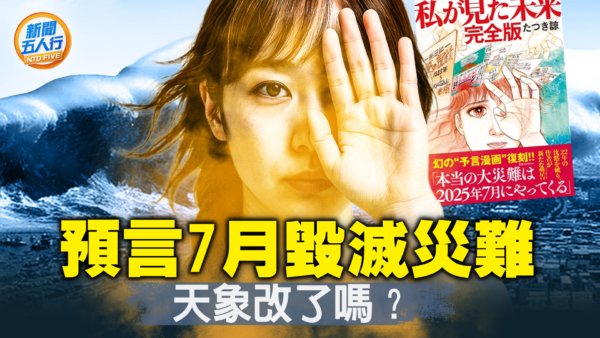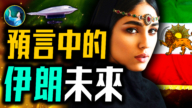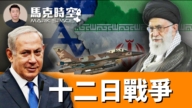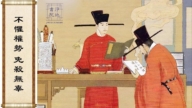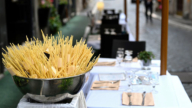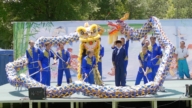【新唐人2014年10月06日讯】通过中共党媒的连番炮轰后,日前香港出现大批所谓反占中人士,不断挑起事端,并殴打占中人群。与此同时,香港特首梁振英发表电视讲话,要求抗议民众撤离,防暴警察也大批出动,并再次喷射胡椒水。不过占中民众没有退让,反而有更多民众出来声援。中国旅美民主斗士陈光诚和魏京生向本台记者表示,香港民众只要坚持下去,就会胜利。
据香港《苹果日报》报导,截至5号晚上8点左右,香港特首办外面,仍然有数百名市民继续留守。有占领多日的市民表示,即使面临警方胡椒喷雾攻击,甚至死亡风险,也不会畏惧。市民同时强调,没有合理理由,集会市民不能失守占领阵地。
4号,香港特首梁振英再度发表电视讲话,指称占中学生堵塞了通往政府总部道路,星期一必须离开。
不过,香港学联5号发出四点回应,声明通往政府总部的入口一直保留开放,请政府不要再混淆视听。在政改问题没有成果前,要求占领者撤离,难以服众,希望政府展开对话诚意,切勿拖延。学联强调,警方妥善处理占领点赞成与反对占领市民之间的冲突,是开展学生和政府对话的前提。
盲人维权律师陈光诚:“有理走遍天下,香港的朋友们你们的要求是合理的,是正当的,是社会发展的必然,中共拒绝给我们本来就属于我们的权利,是反动的,是逆历史潮流而动的,我们只要坚持就能胜利,世界人民都在看着我们,都在支持我们。”
3号晚,部分所谓反对占中的市民,对占中学生大打出手,甚至专门有针对女学生的流氓队伍对女学生进行性侵犯。外界不断发现,攻击香港占中人士中,有不少可疑人物。
由于反占中人士持续挑起冲突,导致警方不断施放胡椒喷雾驱赶占中学生。截至5号下午6点,已有165人入院治疗,大部分已经出院,9名仍留医。
在经历了催泪弹、胡椒喷雾和黑社会的暴力洗礼之后,4号晚,有超过十万的香港市民走出来,逼爆金钟。
而警察公共关系科总警司许镇德,在被问到清场能否不使用催泪弹或橡胶子弹时,没有正面回答,只是说会在适当时候采取适当行动,警方有信心有决心去恢复社会秩序。
旅美民主活动家魏京生:“其实是共产党内斗引起的矛盾,本来香港的事情没那么激烈,但是共产党里头有一批人在不断的挑,就跟六四差不多,把群众情绪挑起来了,所以变成这么一个激烈街头运动了,这是第一,第二这个运动起来了,对中共来说,那是一个烫手的山芋,基本来讲,我觉得香港的群众能坚持下去,一定能取得一个比较好的结果。”
那么,这次香港警方会不会像外界担心的那样,暴力清场呢?
陈光诚:“香港不是天安门,现在的社会也不是你把灯一关就能做坏事的时候了,中共现在我觉得可能一方面在看着香港,一方面全力盯在已经觉醒的公民身上,如果他转身去对付香港的民众的话,中国的公民我想也不会袖手旁观。”
魏京生:“我相信中共里头有很多有良知的上层领导,他们也不愿意再出现一次六四,因为这一次环境不一样了,这一次再出现一次,我觉得共产党可能就有点扛不住了,上次可能蒙混过关了,国际社会在拍着共产党的马屁,要联合起来对付苏联。”
台湾民进党主席蔡英文指,香港占中行动给予台湾人启示,认为只要大家团结站出来,就可以改变命运。
学联秘书长周永康为占领行动对市民带来不便致歉,他重申,本次运动绝非“革命”。今天的不便,是为了将来民主道路的畅通。
采访编辑/刘惠 后制/萧宇
Chen Guangcheng:
The Keys To Wining Occupy Central Are Endurance and Persistence
After party mouthpieces attacked Occupy Central for days,
a large number of so-called Occupy Central opponents
appeared in Hong Kong.
They instigated many conflicts and used violence
to attack protesters.
Hong Kong’s chief executive Leung Chun-ying also spoke
on TV, demanding protesters to retreat.
Riot police were also dispatched on a large scale,
and used pepper spray against protesters.
Despite all of this, Occupy Central protesters did not
step back.
On the contrary, more Hong Kongers joined them.
Famous democratic activists Chen Guangcheng
and Wei Jingsheng, who both live in the U.S. now,
told NTD that they believe Hong Kong people will win
the battle if they can endure and persist.
According to Apply Daily, hundreds of civilians remained put
outside the Office of the Chief Executive as of 8 p.m. Oct. 5.
Those who had stayed there over days said they were afraid
of a pepper spray attack from police or even death.
Other civilians said protesters should not easily
retreat from their “battle field.”
On Oct. 4, Hong Kong’s chief executive Leung Chun-ying
gave another TV address.
Leung claimed student protesters had blocked the road
to the government headquarters.
He required all protesters to leave by Monday.
In response, Hong Kong Federation of Students (HKFS)
made an announcement on Oct. 5, stating the entrance
to the government building had always been left open.
HKFS asked the Hong Kong government to stop making
misleading statements;
The public will not be convinced if protesters are required to
leave without making any progress in political reform issues.
HKFS hopes the government stops dragging on and shows
some sincerity in beginning dialogue with protesters.
HKFS said the precondition for any conversation is that
the police have to properly resolve conflicts between
pro and anti Occupy Central groups.
Chen Guangcheng, blind rights activist: ”With justice
on your side, you can go anywhere.
I want to tell my friends in Hong Kong, “your demands are
reasonable and legitimate, as they follow the right direction
in social development.
The Chinese Communist Party (CCP) refuses to give us rights
that we should have since birth, so it is reactionary
and acts against the tide of history.
We will win the battle as long as we endure and persist.
The whole world is watching and supporting us.’”
On the evening of Oct. 3, some residents claiming to be
opponents of Occupy Central violently attacked protesters.
There were even hooligans focusing on sexual assault
against female students.
Global media has pinpointed many suspicious characters
among the anti Occupy Central group.
The conflicts started by Occupy Central opponents
also gave police the excuse to continuously use pepper
spray against students.
By 6 p.m. on Oct. 5, 165 were sent to hospital.
Most of them had been discharged, but nine remained
in the hospital.
After experiencing tear gas attacks, pepper spray
and mafia-like groups, over 100,000 Hong Kongers
gathered at Admiralty for protest on the evening of Oct. 4.
On the other hand, when asked about whether police will
stop using tear gas or rubber bullets, the director
of Hong Kong Police Public Relations Branch
did not reply directly.
Instead, he only said HK police would, “take proper action
at proper times” and “have the determination
to recover social order.”
Wei Jingsheng, democratic activist: ”The conflicts mostly
result from the CCP’s internal struggle.
Otherwise it should have not been that bad.
There are always a group of people stirring things up
inside the CCP.
They provoke public sentiment like what they did
during the June Fourth Incident.
Therefore we have seen street protests turning into
such tough situations.
But meanwhile the movement has also become a hot
potato for the CCP.
In general, I think if Hong Kong people can stick to what they
are doing right now, we will see a good ending to the story.”
The question is whether HK police will use violence
to drive protesters away.
Many are concerned about this.
Chen Guangcheng: ”Hong Kong is not Tiananmen Square.
In the modern world, you can no longer turn the light off
and do whatever you want.
The CCP is focusing on Hong Kong, but I think meanwhile
it is also guarding over those awakened Chinese citizens.
If the party really does something to Hong Kong people,
Chinese people may not sit it out.”
Wei Jingsheng:”I believe there are conscientious CCP leaders
who do not want to witness another June Fourth Incident.
After all, the world has changed.
If another June Fourth Incident occurs,
the CCP will probably not survive that.
Last time it muddled through as the global society still
needed it to resist the Soviet Union.”
Tsai Ing-wen, Chair of Taiwan’s Democratic Progressive Party,
said Hong Kong’s Occupy Central movement could teach
the Taiwanese a good lesson.
That is, when people unite together
they can change their lives.
HKFS secretary-general Chow Yong-kang apologized
for inconveniencing Hong Kong people’s daily life
due to Occupy Central.
Chow said that the movement is not a revolution,
and today’s inconvenience will serve to clear the road
for future democracy.
Interview & Edit/LiuHui Post-Production/XiaoYu


